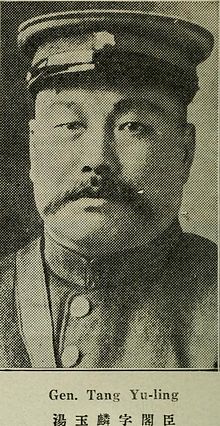Tang Yulin
Tang Yulin ( Chinese 汤玉麟 , Pinyin Tāng Yùlín , W.-G. T'ang Yü-lin ; * 1877 in Fuxin , Liaoning , † 1937 in Tianjin ) was a Chinese warlord of the Fengtien clique (奉系 军阀; 奉系 軍閥Fèng Xì Jūnfá) and chairman of the government of Rehe (Jehol).
Life
Tang Yulin was born in Fuxin , Liaoning in 1871 . In 1902 he joined the Fengtian First Road Defense Sentry Patrol Battalion and became an officer . In 1912 he was given command of the 27th Regiment , 27th Cavalry - Division , and the following year he was appointed commander of 52. (53.) Brigade transported. In 1917 he took part in the reinstatement of the Qing Dynasty under Emperor Puyi , which General Zhang Xun was only able to maintain for two weeks. After Zhang Xun was defeated by General Duan Qirui , he fled to Fuxin to live as a private citizen. However, he returned in 1919 and was appointed inspector of Fengtian Province , one of the three Northeastern provinces. In May 1921 he was promoted to commander of the 11th Brigade. During the Second Zhili-Fengtian War in 1924, he commanded the Fengtian 11th Infantry Division .
In 1926 he was appointed commander of the r and also received the post of chairman of the government of Rehe. He held this post from April 5, 1926 to July 1932. After the flag change in 1928 (Chinese unification) at the end of the northern campaign (1926-1927) Tang was confirmed by the Guomindang Party in his post and made governor and commander of the 36th Division . His numerous expropriations and taxes brought him large income, which he used to buy luxury villas in Italian concession in Tianjin . He also took part in the opium trade and ran an opium factory at his residence in Chengde, as well as trading Manchu antiques in the trading ports .
In late February 1933, attacked the Japanese in the operation Nekka to Jehol. At the Battle of Deer , the ill-equipped and poorly commanded Tang forces soon gave up, despite the mountainous terrain and blizzards that hampered the Japanese. Some of the officers even went over to the Japanese. When Tang realized that his capital was about to fall, he misused 200 trucks that were originally intended to supply his army in order to transfer his fortunes to Tianjin. When the convoy was stopped and the cargo was brought up at the Great Wall of China , Marshal Zhang Xueliang ordered Tang to be arrested. He fled the province to Chahar with a two-hundred-strong bodyguard , along with the remnants of his provincial units.
On September 10, 1933, Tang met with Fang Zhenwu , Ji Hongchang and Liu Guitang , the remaining leaders of the Chahar Anti-Japanese People's Army near Yunzhou , where the army was being reorganized. Tang was appointed the deputy chief in command. Liu Guitang, however, was persuaded by Song Zheyuan to switch sides and then stopped Tang from joining Ji and Fang in their march on Beijing. After Fang Zhenwu and Ji Hongchang failed, Tang turned against Liu Guitang and chased him out of Chahar in December 1933.
In May 1934, Tang became Song Zheyuan's chief advisor in the command of the Beijing government and the 29th Army . He was forced to resign six months later, and then retired to his residence in Tianjin and lived there until he died in May 1937.
literature
- Jonathan Fenby: Chiang Kai Shek: China's Generalissimo and the Nation He Lost. Carroll & Graf Publishers 2004. ISBN 0-7867-1318-6
- Guo Rugui: 中国 抗日战争 正面 战场 作战 记 ( Zhong guō kàngrì zhànzhēng zhèng mìan zhàn chǎng zuò zhàn jì; war campaigns in China's anti-Japanese war). Huang Yuzhang (ed.) Jiangsu People's Publishing House 2005-7-1 ISBN 7214030349 [1]
- Phillip Jowett: Rays of the Rising Sun: Japan's Asian Allies 1931-1945 Volume 1: China and Manchukuo. Helion and Company Ltd. 2005 ISBN 1-874622-21-3 (Encyclopedic representation of the protagonists of the Second Sino-Japanese War)
Web links
- 湯玉麟
- Aug. 1, 1932 TIME magazine: Rape of Jehol?
- Time Magazine : On Bended Knee. 1933-01-23.
- Time Magazine : Bumps & Blood. 1933-02-27.
- Mar. 6, 1933 TIME magazine: War of Jehol
- Time Magazine : Two-Gun Tang. 1933-03-06.
- Time Magazine : Glorious 16th. 1933-03-13.
- Time Magazine : CHINA Generalissimo's Last Straw. 1933-12-11.
| personal data | |
|---|---|
| SURNAME | Tang, Yulin |
| ALTERNATIVE NAMES | 湯玉麟; 汤玉麟; Tāng Yùlín (pinyin) T'ang Yü-lin (Wade-Giles) |
| BRIEF DESCRIPTION | chinese warlord |
| DATE OF BIRTH | 1877 |
| PLACE OF BIRTH | Fuxin , Liaoning |
| DATE OF DEATH | 1937 |
| Place of death | Tianjin |
